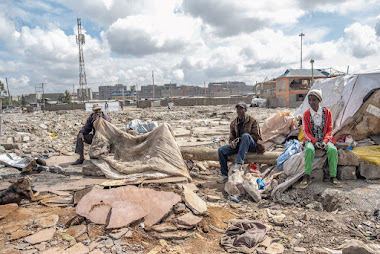Evans Mutisya sits hunched over on a chair to the side of the road in the Mukuru kwa Njenga informal settlement, or slum, in Kenya’s capital, Nairobi. The fifteen-year-old’s head rests heavily in the palms of his hands. He is writhing in pain. For more than a week, he has been in the hospital where doctors have attempted to treat a bullet wound.
On December 27, as Nairobi’s residents spent time with family or traveled to the coastal region for the holidays, the impoverished residents of Mukuru kwa Njenga were gifted with live bullets by Kenyan police. Dozens of families, including Mutisya and his family, have slept in a sprawling tent settlement for more than two months, erected on top of the ruins of their homes, destroyed in a mass government demolition campaign that began in October. Bulldozers destroyed at least 13,000 homes, along with businesses and schools, and displaced some 76,000 people.
Tensions reached their breaking point on December 27 when clashes broke out between police and residents. Mutisya was inside one of the makeshift tents at the time. “They [the police] were shooting tear gas and the gas came into the tent,” Mutisya recounts, speaking in a low tone. “I ran out from the tent and toward the water tank on the street to wash my face.” At that moment, a police officer shot the teen in the lower back, the bullet exiting from the front of his stomach.
On pure adrenaline, he ran from the officer, who was charging toward him, finally collapsing when bystanders crowded around to help him. Since being released from the hospital, Mutisya has been unable to lie on his back or his front, owing to the excruciating pain from the bullet wound. Police shot and killed two others on that same day, according to the residents, while scores of others were injured.
The demolitions and evictions in Mukuru kwa Njenga have shined a bright light on the historical injustices and state corruption shaping Nairobi’s rapid urban development. While these projects have provided comfort and convenience to the city’s rich, they have unleashed extreme violence on the poor of the informal settlements, who make up the majority of Nairobi’s population.



No comments:
Post a Comment